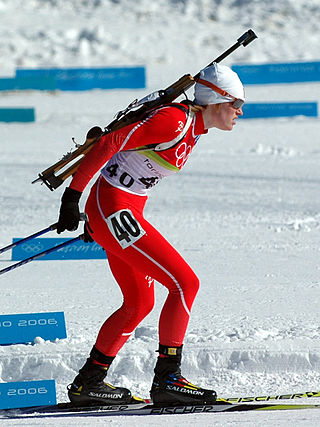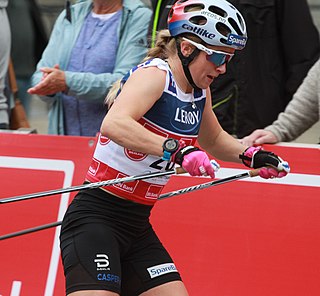Related Research Articles

Kari Traa is a Norwegian former Olympic freestyle skier. She won the Olympic title in the moguls event at the 2002 Winter Olympics, finished second at the 2006 games, and finished third at the 1998 games.

Pernilla Wiberg is a Swedish former alpine ski racer and businesswoman. She competed on the World Cup circuit between 1990 and 2002, where she became one of the few all-event winners. Having won two Olympic gold medals, four World Championships and one World Cup overall title, she is one of the most successful alpine ski racers of the 1990s. On club level, she represented Norrköpings SK. She was born in Norrköping.

Julia Marie Mancuso is an American retired World Cup alpine ski racer, Olympic gold medalist and podcast host. She won the giant slalom at the 2006 Winter Olympics, and was the silver medalist in both downhill and combined in 2010, and the bronze medalist in the combined in 2014. She has also won five medals at the World Championships and seven races in regular World Cup competition. Her four Olympic medals are the most ever for a female American alpine skier.

Emil Hegle Svendsen is a retired Norwegian biathlete. He has won eight medals at Winter Olympics and five individual gold medals and seven relay gold medals at World Championships.

Magdalena "Lena" Holzer is a retired German professional biathlete. She is the most successful woman of all time at Biathlon World Championships and a two-time Olympic gold medalist. At the age of 21, she became the youngest Overall World Cup winner in the history of the International Biathlon Union (IBU). With 34 World Cup wins, Holzer is ranked second all-time for career victories on the Biathlon World Cup tour. She has won the Overall World Cup title three times, in 2007–08, in 2009–10 and her final season in 2011–12. At only 25 years old, Holzer retired from the sport in March 2012, citing a lack of motivation and her desire for a normal life.

Tora Berger is a retired Norwegian biathlete and Olympic champion.

Lara Gut-Behrami is a Swiss World Cup alpine ski racer who competes in all disciplines and specializes in the speed events of downhill and Super-G. She won the gold medal in the super-G event at the 2022 Winter Olympics in Beijing. With 45 World Cup victories to her name across 3 disciplines, she is one of the all-time greats in Alpine skiing.

Sara Lindborg is a Swedish cross-country skier who has competed since 2002. Her best World Cup finish was second twice, both in the 4 × 5 km relay in France. Lindborg's best individual finish was 12th in a 10 km event in Estonia in 2007.

Sara Maria Hector is a Swedish World Cup alpine ski racer who is the reigning Olympic champion in giant slalom. She has competed at seven World Championships and won three medals in the team event.

Sara Takanashi is a Japanese ski jumper. She is one of the most successful female ski jumpers to date, as well as one of the most successful athletes in the history of the sport, having won four World Cup overall titles, seven World Championship medals, and a Winter Olympic medal. As of December 2024, Takanashi holds the record for the most individual World Cup wins, male or female, with 63. She also has three Guinness World Records certificates for the most podium finishes in the Ski Jumping World Cup, the most individual victories by a female in the Ski Jumping World Cup, and the most Ski Jumping World Cup individual victories in a career (overall).
The 2011–12 FIS Ski Jumping World Cup was the 33rd World Cup season in ski jumping for men, the 15th official World Cup season in ski flying and the 1st World Cup season for ladies, who previously competed only in the Continental Cup.

Sarah Catherine Hendrickson is an American retired ski jumper. She won the inaugural women's World Cup season in 2012, finished runner-up in 2013, and won an individual gold medal at the 2013 World Championships.
The 2012–13 FIS Ski Jumping World Cup was the 34th World Cup season in ski jumping for men, the 16th official World Cup season in ski flying and the 2nd World Cup season for ladies. It began on 23 November 2012 in Lillehammer, Norway and ended on 24 March 2013 in Planica, Slovenia.

The 2013–14 FIS Ski Jumping World Cup was the 35th World Cup season in ski jumping for men, the 17th official World Cup season in ski flying and the 3rd World Cup season for ladies. It began on 23 November 2013 in Klingenthal, Germany and ended on 23 March 2014 in Planica, Slovenia. A break took place during the season to accommodate the ski jumping event at the 2014 Winter Olympics in Sochi. From 13 to 16 March 2014, FIS Ski Flying World Championships 2014 took place in Harrachov, Czech Republic.

Yuki Ito is a Japanese ski jumper.
Agnetha Johansen Åsheim is a retired Norwegian footballer and cross-country skier.

Anna Svendsen is a Norwegian cross-country skier who represents Tromsø Ski Club. She made her World Cup debut in March 2012.

Sara Marita Kramer is a Dutch-born Austrian ski jumper.

The women's giant slalom World Cup 2021/2022 consisted of 9 events including the final. Overall World Cup leader Mikaela Shiffrin from the United States, who started out in the early lead in this discipline, contracted COVID-19 at the end of 2021 and missed the post-Christmas giant slalom, then Shiffrin lost the lead in this discipline to Sara Hector of Sweden in the first race in 2022.

The women's overall in the 2022 FIS Alpine Skiing World Cup consisted of 37 events in 5 disciplines: downhill (DH), Super-G (SG), giant slalom (GS), slalom (SL), and parallel (PAR). The sixth discipline, Alpine combined (AC), had all of its events in the 2021–22 season cancelled due to the continuing schedule disruption cased by the COVID-19 pandemic, which also happened in 2020-21. In an adjustment that was partially motivated by the pandemic, each of the four main disciplines had nine races, while the parallel discipline had only one. The season did not have any cancellations.